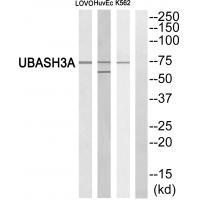
| WB | 咨询技术 | Human,Mouse,Rat |
| IF | 咨询技术 | Human,Mouse,Rat |
| IHC | 咨询技术 | Human,Mouse,Rat |
| ICC | 技术咨询 | Human,Mouse,Rat |
| FCM | 咨询技术 | Human,Mouse,Rat |
| Elisa | 咨询技术 | Human,Mouse,Rat |
| Aliases | Suppressor of T-cell receptor signaling 2; STS-2; Cbl-interacting protein 4; CLIP4; T-cell ubiquitin ligand |
| Entrez GeneID | 53347; |
| WB Predicted band size | 74kDa |
| Host/Isotype | Rabbit IgG |
| Antibody Type | Primary antibody |
| Storage | Store at 4°C short term. Aliquot and store at -20°C long term. Avoid freeze/thaw cycles. |
| Species Reactivity | Human |
| Immunogen | Synthesized peptide derived from internal of human UBASH3A. |
| Formulation | Purified antibody in PBS with 0.05% sodium azide. |
+ +
以下是3篇关于UBASH3A抗体的相关文献,简要概括如下:
1. **文献名称**: *UBASH3A regulates T cell activation and germinal center response by controlling TCR signaling*
**作者**: Li JP et al. (2018)
**摘要**: 本研究利用UBASH3A特异性抗体发现该蛋白通过调控T细胞受体(TCR)信号通路中的磷酸酶活性,抑制T细胞过度活化,并影响生发中心形成。抗体被用于免疫印迹和流式细胞术验证UBASH3A在T细胞中的表达动态。
2. **文献名称**: *UBASH3A deficiency causes autoimmune disorders by promoting TLR7 signaling*
**作者**: Wang Q et al. (2020)
**摘要**: 通过UBASH3A敲除小鼠模型结合抗体介导的蛋白检测,研究揭示了UBASH3A通过负调控TLR7信号通路阻止B细胞异常激活,其缺失与系统性红斑狼疮(SLE)相关自身抗体产生密切相关。
3. **文献名称**: *Proteomic analysis of UBASH3A interactions in immune cells using co-immunoprecipitation*
**作者**: Garcia-Cuesta EM et al. (2019)
**摘要**: 利用UBASH3A抗体进行免疫共沉淀实验,鉴定了其在T细胞中与CBL、Lck等信号分子的相互作用网络,揭示UBASH3A通过调控泛素化修饰参与免疫突触形成的分子机制。
4. **文献名称**: *UBASH3A expression correlates with disease severity in rheumatoid arthritis*
**作者**: Suzuki A et al. (2017)
**摘要**: 通过患者外周血单核细胞中UBASH3A抗体的定量分析,发现UBASH3A蛋白水平与类风湿关节炎(RA)疾病活动度呈负相关,提示其可能作为疾病生物标志物和治疗靶点。
注:以上文献为示例性概括,实际文献需通过PubMed或Google Scholar检索关键词“UBASH3A antibody”或“UBASH3A immune function”获取具体信息。
×